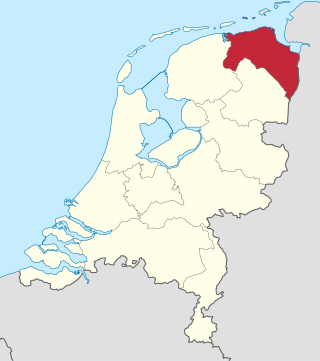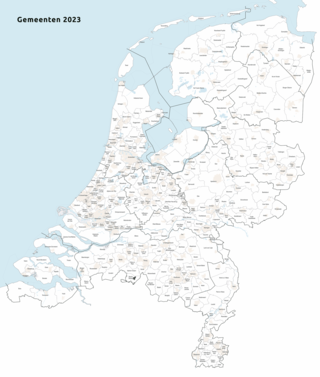
Groningen is the northeasternmost province of the Netherlands. It borders on Friesland to the west, Drenthe to the south, the German state of Lower Saxony to the east, and the Wadden Sea to the north. As of January 2023, Groningen had a population of about 596,000, and a total area of 2,955 km2 (1,141 sq mi).

There are twelve provinces of the Netherlands representing the administrative layer between the national government and the local governments, with responsibility for matters of subnational or regional importance.

The Netherlands is a parliamentary representative democracy. A constitutional monarchy, the country is organised as a decentralised unitary state. The Netherlands can be described as a consociational state. Dutch politics and governance are characterised by a common striving for broad consensus on important issues, within both of the political community and society as a whole.

Flemish Brabant is a province of Flanders, one of the three regions of Belgium. It borders on the Belgian provinces of Antwerp, Limburg, Liège, Walloon Brabant, Hainaut and East Flanders. Flemish Brabant also surrounds the Brussels-Capital Region. Its capital is Leuven. It has an area of 2,118 km2 (818 sq mi) which is divided into two administrative districts containing 65 municipalities. As of January 2024, Flemish Brabant had a population of over 1.19 million.

Barend Willem Biesheuvel was a Dutch politician of the defunct Anti-Revolutionary Party (ARP) now the Christian Democratic Appeal (CDA) party and jurist who served as Prime Minister of the Netherlands from 6 July 1971 until 11 May 1973.

The Kingdom of Belgium is divided into three regions. Two of these regions, Flanders and Wallonia, are each subdivided into five provinces. The third region, Brussels, does not belong to any province, nor is it subdivided into provinces. Instead, it has amalgamated both regional and provincial functions into a single "Capital Region" administration.

Since 1 January 2023, there have been 342 regular municipalities and three special municipalities in the Netherlands. The latter is the status of three of the six island territories that make up the Dutch Caribbean. Municipalities are the second-level administrative division, or public bodies, in the Netherlands and are subdivisions of their respective provinces. Their duties are delegated to them by the central government and they are ruled by a municipal council that is elected every four years. Municipal mergers have reduced the total number of municipalities by two-thirds since the first official boundaries were created in the mid 19th century. Municipalities themselves are informally subdivided into districts and neighbourhoods for administrative and statistical purposes.
A councillor, alternatively councilman, councilwoman, councilperson, or council member, is someone who sits on, votes in, or is a member of, a council. This is typically an elected representative of an electoral district in a municipal or regional government, or other local authority. The title of a councillor varies geographically, with a name generally being preceded by their title in formal or council-related situations in many places.

The premier of Ontario is the head of government of Ontario. Under the Westminster system, the premier governs with the confidence of a majority the elected Legislative Assembly; as such, the premier typically sits as a member of Provincial Parliament (MPP) and leads the largest party or a coalition of parties. As first minister, the premier selects ministers to form the Executive Council, and serves as its chair. Constitutionally, the Crown exercises executive power on the advice of the Executive Council, which is collectively responsible to the legislature.

The Socialist Party is a democratic socialist and social democratic political party in the Netherlands. Founded in 1971 as the Communist Party of the Netherlands/Marxist–Leninist, the party has since moderated itself from Marxism–Leninism and Maoism towards democratic socialism and social democracy.

The mayor of Toronto is the head of Toronto City Council and chief executive officer of the municipal government. The mayor is elected alongside city council every four years on the fourth Monday of October; there are no term limits. While in office, mayors are styled His/Her Worship.

The Federation Council, unofficially Senate, is the upper house of the Federal Assembly of Russia. It was established by the Constitution of the Russian Federation in 1993.

A King's commissioner is the head of government and legislature in a province of the Netherlands. When the reigning monarch is a woman, the title is Queen's commissioner.

The Government of Ontario is the body responsible for the administration of the Canadian province of Ontario. The term Government of Ontario refers specifically to the executive—political ministers of the Crown, appointed on the advice of the premier, and the non-partisan Ontario Public Service, who staff ministries and agencies to deliver government policies, programs, and services—which corporately brands itself as the Government of Ontario, or more formally, His Majesty's Government of Ontario.

The provincial council, also known as the States-Provincial, is the provincial parliament and legislative assembly in each of the provinces of the Netherlands. It is elected for each province simultaneously once every four years and has the responsibility for matters of sub-national or regional importance. The number of seats in a provincial council is proportional to its population.

The politics of the Dutch provinces takes places within the framework of the politics of the Netherlands. The province is the second-highest level of government, after the national government. The Netherlands is divided into twelve provinces.

In the Netherlands, the municipal executive is the executive board of a municipality. It plays a central role in municipal politics in the Netherlands, similar to the communal college in Belgium. It consists of the mayor and the members of the municipal executive (aldermen).

Municipal politics in the Netherlands is an important aspect of the politics of the Netherlands. The municipality is the lowest level of government, but this does not reflect the importance that the Amsterdam and Rotterdam governments play in Dutch political life. There are a total of 342 municipalities in the Netherlands.
A premier in South Africa's provinces is the head of the provincial government. This position mirrors the president's role at the national level, functioning as the chief executive and leading the province's executive council. Premiers are chosen by members of the provincial legislature, typically from the dominant political party. Similar to the President and national cabinet, the Premier appoints Members of the Executive Council (MECs) to oversee various provincial departments.

Cornelia Johanna "Carola" Schouten is a Dutch politician of the Christian Union (CU). She was Minister of Agriculture, Nature and Food Quality and Third Deputy Prime Minister in the third Rutte cabinet from 2017 to 2022. She continued to serve as Third Deputy Prime Minister in the fourth Rutte cabinet alongside her position as Minister for Poverty Policy, Participation and Pensions until July 2024. On 10 October 2024, Schouten became the mayor of Rotterdam succeeding Ahmed Aboutaleb.













